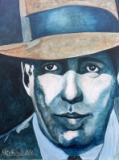Judges
The first black judge to have been appointed by the president to the federal bench was William Henry Hastie, whom Franklin Delano Roosevelt named as a district court judge for the U.S. Virgin Islands in 1937.

Deval Patrick was the 71st Governor of Massachusetts, serving from 2007 to 2015. A member of the Democratic Party, Patrick served as an Assistant United States Attorney General under President Bill Clinton. He is the state's first African American governor.
Born July 31, 1956, Deval Laurdine Patrick was raised by his single mother, Emily Mae Patrick on the South Side of Chicago. His father Laurdine Kenneth, known as "Pat" was a jazz musician. When he was four years old his father abandoned the family to pursue a musical career, leaving Deval, his mother, and sister impoverished. The family, which spent several months on welfare, was at one point so destitute that they could afford only two beds for their basement apartment, a problem that required one of them sleep on the floor every third night.
As a child, Patrick went to the Mary C. Terrell elementary school, a building that bordered the Robert Taylor Homes, a large and notoriously dangerous housing project. So great was the threat of violence that students had to slide a pass under the school door to get inside. Young Deval worried that the rest of his academic career would be equally bleak. The Woodlawn riots, which tore Chicago apart in 1968 did little to ease his fears
Always a good student, Patrick won a scholarship to Milton Academy in Massachusetts in the eighth grade. As he recalled for the Boston Globe, "I just got a letter one day from Milton [that] said you are admitted to Class 4. I wasn't sure it wasn't a military academy until I got there. The whole letter was in a language I didn't quite understand." This language barrier became even more apparent several months later, when Deval arrived for the first day of school. In a story he has repeated often, Patrick says that the list of required clothing sent by the school called for a jacket, and his proud family splurged on one. Only as his classmates were dressing for dinner that evening did Deval realize his error, the school wanted its students in blazers, not the windbreaker he was wearing.
Deval Patrick remembers getting accepted into Harvard and he told the story in his Los Angeles Town Hall speech. "Now, while everyone at Milton is of course expected to go to college, you must understand that no one in my family had ever been. I had applied to five colleges, but there was only one I really wanted. When the letter came on April 15 that I was admitted to that one, I called home and my grandmother picked up the phone. I told her my news, that I was going to Harvard. She told me how proud she was of me, so pleased, so excited, then she paused and said, "Where is that anyway?" His grandmother's words, he said, gave him an important perspective on success: "And I never forgot. Not at Harvard. Not at Harvard Law School. Not through any of the extraordinary experiences or associations I have had since that day."
In his undergraduate studies Patrick majored in English and American literature, where he discovered a particular fondness for the works of Mark Twain. Graduating cum laude, Deval Patrick received a $5,000 Rockefeller Fellowship, which he used to study and travel in Africa. At the end of the year, Patrick went on to attend Harvard Law School.
After graduating from Harvard, Deval Patrick practiced law with the NAACP Legal Defense and Educational Fund. He later joined a Boston law firm, where he was named a partner at the age of 34. In 1994, President Bill Clinton appointed Patrick Assistant Attorney General for the Civil Rights Division of the Department of Justice, where he worked on issues including racial profiling and police misconduct. Deval Patrick returned to Boston in 1997 to work in private law. In the following years he worked as general counsel for Texaco in New York City and Coca-Cola in Atlanta, which were both facing large racial discrimination settlements.
He is an eloquent and impassioned champion of affirmative action and an outspoken advocate for the nation's minority and disabled citizens. His zealous enforcement of civil rights laws stems from his conviction, voiced in a Los Angeles Town Hall speech, that "legions of racial and ethnic minorities feel less of a sense of opportunity, less assured of our equality, and less confident of fair treatment today than we have in many, many years."
When Deval Patrick announced his candidacy for the 2006 gubernatorial election in Massachusetts, Patrick was initially seen as a dark horse candidate, but ultimately won the Democratic primary against veteran politicians Thomas Reilly and Chris Gabrielli. He went on to defeat Republican Lieutenant Governor Kerry Healey in the general election, and was inaugurated in January 2007.
In his first term, Patrick oversaw the implementation of the state's 2006 health care reform program, increased funding to education and life sciences, won a federal Race to the Top education grant, passed an overhaul of state transportation industries to create the Massachusetts Department of Transportation, worked with the legislature to defend the legality of same-sex marriage, and increased the state sales tax from 5% to 6.25%.
His two legislative battles to implement casino gambling failed: he could not win the approval of the House of Representatives in March 2008, and he vetoed a bill passed by the legislature in August 2010 for going too far. Throughout his term, Patrick faced an economic recession and criticism for several political missteps.
During his second term as Governor, Deval Patrick called for sweeping changes at the Massachusetts Parole Board, including the resignations of five board members and a prison official who had been the agency’s executive director. Patrick said he was moving to restore the public’s confidence in an agency whose failures had led to the killing of veteran Officer John “Jack” Maguire on the day after Christmas. “After this review, I cannot say that the Parole Board or parole office did all they could to ensure public safety,” he said at a State House news conference.
Don't miss a single page. Find everything you need on our complete sitemap directory.
Listen or read the top speeches from African Americans. Read more
Read about the great African Americans who fought in wars. Read more
African Americans invented many of the things we use today. Read more
Thin jazz, think art, think of great actors and find them here. Read more
Follow the history of Black Americans from slave ships to the presidency. Read more
Olympic winners, MVPS of every sport, and people who broke the color barrier. Read more
These men and women risked and sometimes lost their life to fight for the cause. Read more
Meet the people who worked to change the system from the inside. Read more

Visit my RedBubble page and use Michael Arnold Art to create greeting cards, T-shirts, mugs, and more.

The variety and impressive numbers of mammals, birds and marine wildlife in Alaska draw visitors from all over the world. For some travelers, Alaska is wilderness, at least compared to what they may know from back home. The pristine wilderness of Alaska is, perhaps, the last vestige of thriving populations of North American wildlife. Where else can you see polar bears, bald eagles, blue and humpbacked whales, gray wolves, grizzly bears, orcas, lynx, moose, and hundreds of other rare and endangered species in their original and undisturbed natural habitats?

Enjoy our website filled with original signed acrylic paintings by award winning Artist Michael Arnold. Located in Citrus County Florida, Michael Arnold is a the editor at the Citrus County Chronicle. When he's not busy being an editor, he is an avid artist who enjoys painting in a variety of styles. We hope you take the time to click on each image to see a larger view and to learn what the artist, Michael Arnold has to say about his paintings.

As dog owners and people who care deeply for animals and wildlife, we wanted our Dog Encyclopedia to be a website that could empower pet owners to create the most positive, loving environment for their dogs. Dog Encyclopedia realizes that owning a dog is like adding a new member to your family.

Floridian Nature has everything your are looking for in Florida nature. The wildlife of Florida is rich and varied, yet most of us are familiar with only a dozen or so species: the "well known endangered species such as manatees and panthers; those, like raccoons and squirrels, that have adapted to urban environments; the frightening alligators and black bears; and those like the armadillo who can't seem to cross the road. Yet they are just a few of the many animal species found in Florida.
